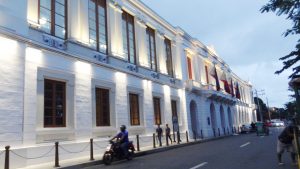THE GOVERNMENT upsized the volume of Treasury bills (T-bills) it awarded on Monday even as rates mostly inched up as it saw strong demand for the short-term papers amid growing expectations of rate cuts by both the Bangko Sentral ng Pilipinas (BSP) and the US Federal Reserve within the year.
The Bureau of the Treasury (BTr) raised P22.6 billion from the T-bills it offered on Monday, higher than the P20-billion program, as total bids reached P46.736 billion, or more than twice the amount placed on the auction block.
Broken down, the BTr borrowed P6.5 billion as programmed from the 91-day T-bills as tenders for the tenor reached P15.51 billion. The three-month paper was quoted at an average rate of 5.717%, 1.9 basis points (bps) above the 5.698% seen last week. Accepted rates ranged from 5.702% to 5.74%.
Meanwhile, the government awarded P9.1 billion in 182-day securities, higher than the P6.5-billion plan, as bids for the tenor reached P17.525 billion. The average rate for the six-month T-bill stood at 5.978%, inching up by 1 bp from the 5.968% fetched last week, with accepted rates at 5.95% to 5.998%.
The BTr doubled the accepted volume of noncompetitive bids for the 182-day T-bills to P5.2 billion as the paper fetched strong demand, it said in a statement.
Lastly, the Treasury raised the planned P7 billion via the 364-day debt papers as demand totaled P13.701 billion. The average rate of the one-year debt decreased by 0.1 bp to 6.072% from the 6.073% quoted last week. Accepted yields were from 6% to 6.09%.
At the secondary market before the auction, the 91-, 182-, and 364-day T-bills were quoted at 5.6845%, 5.9839%, and 6.0480%, respectively, based on PHP Bloomberg Valuation Service Reference Rates data provided by the Treasury.
The Treasury made a full award of its T-bill offer as it saw “overwhelming” demand, with the six-month tenor almost thrice oversubscribed, a trader said in a text message.
Investors swamped the offering as they priced in potential cuts in benchmark interest rates here and abroad, the trader said.
“Although higher week on week, the yields in the T-bill space remain lower compared to BSP facilities and the BSP policy rate,” the trader added.
Expectations of a BSP rate cut as early as next month led to good demand for the T-bills as investors want to lock in high yields ahead of the start of the central bank’s easing cycle, Rizal Commercial Banking Corp. Chief Economist Michael L. Ricafort said in a Viber message.
Increased odds of the Fed kicking off its own rate cut cycle by September and dovish signals from the US central bank chief also affected T-bill yield movements, Mr. Ricafort added.
BSP Governor Eli M. Remolona, Jr. last month said the Monetary Board may deliver its first rate cut in over three years at its Aug. 15 review as they expect inflation to continue easing this semester.
The BSP last month kept its policy rate at a 17-year high of 6.5% for a sixth straight meeting.
Meanwhile, the “last mile” of the Federal Reserve’s battle against inflation may have shortened to a last lap after US consumer prices unexpectedly fell in June, shoring up policy makers’ confidence that they are winning the fight and paving the way to interest rate cuts in the coming months, Reuters reported.
At the Fed’s July 30-31 meeting, the policy makers are expected to maintain the policy rate at 5.25%-5.5%, but they may set the table to lower rates in light of renewed progress on easing price pressures.
After July, the Fed’s next policy meeting is in mid-September.
In two days of testimony before Congress last week, Fed Chair Jerome H. Powell appeared to edge the door open to a September rate cut, saying that the US economy was “no longer overheated” and that “more good data” on inflation would lay the groundwork to reduce the benchmark policy interest rate.
On Tuesday, the BTr will offer P30 billion in reissued 10-year Treasury bonds (T-bonds) with a remaining life of nine years and six months.
The Treasury wants to raise P215 billion from the domestic market this month, or P100 billion from T-bills and P115 billion through T-bonds.
The government borrows from local and foreign sources to help fund its budget deficit, which is capped at P1.48 trillion or 5.6% of gross domestic product for this year. — AMCS with Reuters
